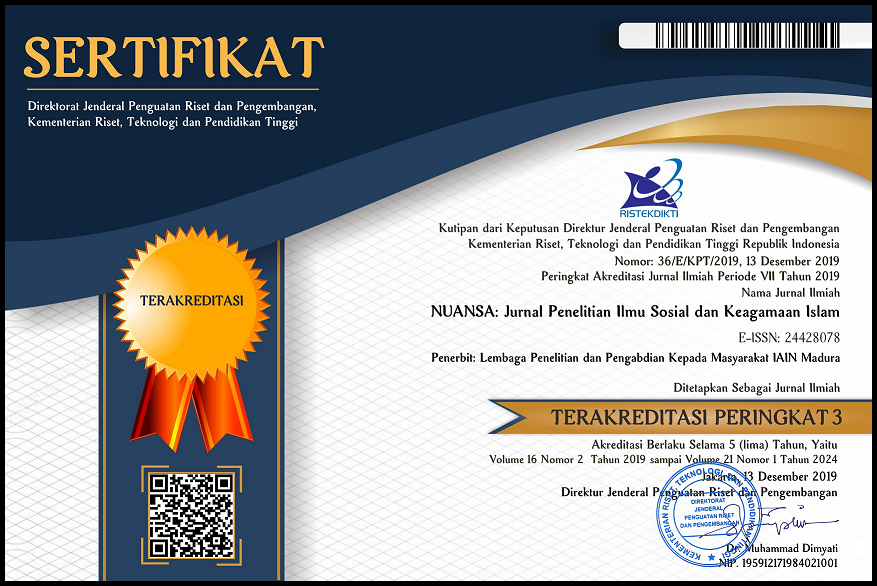KONTRIBUSI POSDAYA MASJID “MIFTAHUL HIDAYAH” DI DESA BULAY KECAMATAN GALIS KABUPATEN PAMEKASAN
 Abstract views: 166
,
Abstract views: 166
,
 PDF downloads: 102
PDF downloads: 102
Abstract
The concept of poverty alleviation is not solely a matter for government but has become the responsibility of the congregation. Action against poverty is jihad in the path of Allah Swt. It seems Empowerment Center has changed the pattern of relations between officials at the village level or the district, employers, the profession with the congregation in the mosque which was originally a pattern of relationships out sider in-sider, different interests,' patterns of kinship, common interest to transform the society into a prosperous self-sufficient. Through Empowerment Center of the mosque, it is expected that a number of poor families successfully assisted to the strengthening of entrepreneurship and access to capital through the funds of the mosque, funds Lakzis, BMT, and the bank of SMES with a system of joint responsibility. Another positive thing happens with the optimal the Mosque based Empowerment Center is increasing the confidence of isoleted society. They have friends from diverse elements of the good academics, the professions, local officials and local leaders are easily accessible and are invited to the discussion. Based on that, then there are three problems that become the basic study in this study, namely: first, how is the strategy of Empowerment Center in conducting empowerment in the community?, second what are the contributions of Empowerment Center of the mosque and the third, what became the Empowerment Center of the mosque “Miftahul Hidayah” selected to be Posdaya National referral 2016 ?
The theory of Empowerment that is worn according to the meaning in language is a process, a way, the deeds make the helpless, namely the ability to do something or ability to act in the form of common sense, endeavor or effort, community is the unity of human life that interact according to a system of certain mores that are continuous, and which is bound by a sense of shared identity, in some of the studies regarding the construction of community, community empowerment is often interpreted as an attempt to give power so their voices heard in order to contribute to the planning and decisions that affect their community, community empowerment can be interpreted as an attempt to restore or improve the ability of a community to be able to do in accordance with the dignity in implementing their rights and responsibilities as members of the community.
Downloads
References
Abbeduto, Leonard. Taking Sides: Clashing Views on Controversial Issues in Educational Psychology Third Edition. McGraw-Hill, Dushkin, 2004
Adedokun, O.M. C.W, Adeyamo, and E.O. Olorunsula. The Impact of Communication on Community Development. J Communication, 1(2): 2010
Anselm Strauss dan Juliet Corbin, Basic Of Qualitative Research. New York : Cambridge University Press, 1987
Aziz, Moh. Ali dkk, Dakwah Pemberdayaan Masyarakat : Paradigma Aksi Metodologi. Yogyakarta : PT. LKiS Pelangi Nusantara Basrowi, 2005
Bagong Suyanto dan Sutinah, Metode Penelitian Sosial. Jakarta : Kencana, 2005.
Bungin, Burhan. Analisis Data Penelitian Kualitatif. Jakarta: PT. Grafindo Persada, 2003.
Chambers, Ress. Participatory Rural Appraisal: Memahami Desa Secara Partisipatif. Oxfam. Kanisius: Yogyakarta, 1996
Chambers, R. Rural Development : Putting The Last First. London ; New York. 1985.
Chalid, Pheni. Otonomi Daerah Masalah, Pemberdayaan dan Konflik. Penebar Swadaya. Cetakan pertama. Jakarta. 2005
Christenson, James A. & Jerry W. Robinson, Jr Ames. Community Development In Perspective. Lowa State University Pres, 1989
Depdiknas. Kamus Besar Bahasa Indonesia, Edisi Ketiga, Jakarta: Penerbit Balai Pustaka. 2003
Friedman, John. Empowerment The Politics of Alternative Development. Blackwell Publishers, Cambridge, USA. 1992
Foy, Nancy. Empowering People at Work, London: Grower Publishing Company. 1994
Glasserfield, E. A Constructivist Approach to Teaching. In L. Steffe & J. Gale (Eds.), Constructivism In Education. Hillsdale, NJ, Lawrence Erlbaum. 1987
Ife, J.W. Community Development: Creating Community Alternatives-vision, Analysiis and Practice. Melbourne : Longman. 1995
Jasper, James M. Social Movement Theory Today: Toward a Theory of Action?. Sociology Compass 4/11 (2010): pp.,965-976, 10.1111/j.9020.2010.000329.x,.New York: Graduate Center of the City University of New York. 2010
Jimu, M.I. Community Development. Community Development:A Cross-Examination of Theory and Practice Using Experiences in Rural Malawi. Africa Development,Vol. XXXIII, No. 2, 2008, 2008
Koentjaraningrat. Manusia dan Kebudayaan di Indonesia. Djambangan. Jakarta. Longman. 2009
Lubis, Hari & Huseini, Martani. Teori Organisasi; Suatu Pendekatan Makro. Pusat Antar Ilmu-ilmu Sosial UI: Jakarta. 1987
Mubarak, Z. Evaluasi Pemberdayaan Masyarakat Ditinjau Dari Proses Pengembangan Kapasitas Pada Program PNPM Mandiri Perkotaan Di Desa Sastrodirjan Kabupaten Pekalongan. Tesis. Program Studi Magister Teknik Pemberdayaan Wilayah Dan Kota. Undip. Semarang. 2010
Muhammad, Sahri. Model Kemitraan Penanggulangan Kemiskinan dan Kesepakatan Lokal Pendekatan Sosial, Lingkungan dan Agama. Malang: Universitas Brawijaya Press, 2012
Moleong, Lexy J. Metode Penelitian Kualitatif. Bandung: PT. Remaja Rosda Karya, 2001
Ndraha, T. Pembangunan Masyarakat Desa. Jakarta: Bina Aksara, 1987
Partanto, Pius A. dkk, Kamus Ilmiah Populer. Surabaya: Arkola,1994
Pearsons, Talcot. The Social System. Routledge is an imprint of Taylor & Francis, an informa company. 1991
Prijono, Onny S. dan Pranarka A.M.W. (ed.). Pemberdayaan: Konsep, Kebijakan dan Implementasi. Jakarta: Centre for Strategic and International Studies (CSIS). 1996
Rusmanto, Joni. Gerakan Sosial Sejarah Perkembangan Teori Kekuatan dan Kelemahannya. Zifatama Publishing. Sidoarjo. 2013
Sadan, Elisheva. Empowerment and Community Planning: Theory and Practice of People-Focused Social Solutions. Tel Aviv: Hakibbutz Hameuchad Publishers.in Hebrew. [e-book]. 1997
Shucksmith, Mark. Future Direction in Rural Development. Carnegie UK Trust. England. 2013
Sipahelut, Michel. Analisis Pemberdayaan Masyarakat Nelayan Di Kecamatan Tobelo Kabupaten Halmahera Utara. Tesis. IPB. Bogor. 2010
Soetomo. Strategi-strategi Pembangunan Masyarakat, Yogyakarta: Penerbit Pustaka Pelajar. 2006
Sugiono, Memahami Penelitian Kualitatif . Bandung: CV. Alfa Beta, 2009
Suharto, Edi. Membangun Masyarakat Memberdayakan Rakyat: Kajian Strategis Pembangunan Kesejahteraan Sosial dan Pekerjaan Sosial.Bandung: PT. Refika Aditama, 2006
Suharto E. Membangun Masyarakat Memberdayakan Rakyat. Kajian Strategi Pembangunan Kesejahteraan Sosial dan Pekerjaan Sosial. Bandung: PT Refika Aditama, 2005
Sukmaniar. Efektivitas Pemberdayaan Masyarakat Dalam Pengelolaan Program Pengembangan Kecamatan (Ppk) Pasca Tsunami Dikecamatan Lhoknga Kabupaten Aceh Besar. Tesis. UNDIP. Semarang. 2007
Usman, Sunyoto. Pembangunan dan Pemberdayaan Masyarakat. Yogyakarta: Pustaka Pelajar, 2004
Wilson, Terry. The Empowerment Mannual, London: Grower Publishing Company. 1996
The journal operates an Open Access policy under a Creative Commons Attribution-NonCommercial 4.0 International License (CC-BY-NC) 
Authors who publish with this journal agree to the following terms:
- Authors retain copyright and grant the journal right of first publication with the work simultaneously licensed under a Creative Commons Attribution License that allows others to share the work with an acknowledgement of the work's authorship and initial publication in this journal.
- Authors are able to enter into separate, additional contractual arrangements for the non-exclusive distribution of the journal's published version of the work (e.g., post it to an institutional repository or publish it in a book), with an acknowledgement of its initial publication in this journal.
- Authors are permitted and encouraged to post their work online (e.g., in institutional repositories or on their website) prior to and during the submission process, as it can lead to productive exchanges, as well as earlier and greater citation of published work.






















